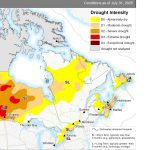Senior Canadian Wheat Board officials were doing damage control on Parliament Hill last week, assuring MPs that they are not opposed to genetically modified wheat.
In fact, board chair Ken Ritter said he thinks it will happen and there will be benefits for farmers who choose to grow GM varieties.
But not yet.
Board president Greg Arason said customers have made it clear they will abandon Canada as a supplier if there is not an assurance that Canadian supplies are GM-free.
“It is evident that under these circumstances, we cannot afford to rush a GM wheat variety onto the market until we can be assured that we will be able to continue to meet customer requirements for non-GM wheat shipments if necessary,” Arason said.
Read Also

Alberta eases water access for riparian restoration
Alberta government removes requirement for temporary diversion licence to water plants up to 100 cubic metres per day for smaller riparian restoration projects
The pre-conditions for introducing a GM variety include a credible segregation system, effective testing and sampling methods and reasonable tolerance levels for GM content.
Under questioning from opposition MPs, Ritter said he believes the pre-conditions can be met but not for a few years.
“We are moving towards a positive conclusion,” he said.
“This is not an anti-technology stance we are taking.”
Some MPs were skeptical about the board’s strategy and attitude.
Saskatchewan Canadian Alliance MP David Anderson noted that when the board called on the government not to register GM wheat before the market is ready, it was joined at the news conference by biotechnology skeptics such as the Council of Canadians and Greenpeace.
“I have a concern you are sleeping with some pretty strange partners,” he told board representatives.
Arason did not respond directly to the issue of board allies. He said it was important that the wheat board let its farmer suppliers know what its international customers want.
“For us to sit silent and not inform farmers what customers are saying would be irresponsible of us,” he said.
Customers like China and Japan have made it clear they are uneasy or outright opposed to the possibility of having GM wheat mixed in with Canadian supplies.
“The U.S. is another large market for western Canadian farmers,” Arason said. “The North American Millers Association has publicly expressed its position that crops that do not have wide market approval should not be placed on the market.”
Ritter told MPs there are predictions that the first country to introduce GM wheat will lose two-thirds of its markets. Then, once customers become more comfortable with the product, other countries will gain the benefit.
He noted that Monsanto’s GM wheat work involves hard red spring wheat grown in Canada rather than white wheat, which would be more adaptable to the United States, so Canada would likely be the first on the market.
“We see little benefit to us,” said Ritter.”Right now, the negatives outweigh the positives.”
















